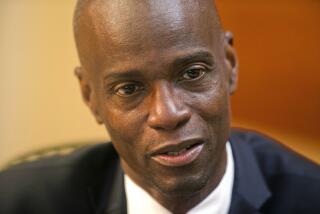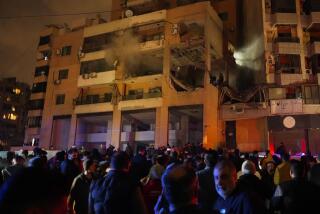U.N. Chief in Haiti Found Dead
- Share via
MIAMI — The commander of the U.N. peacekeeping force in Haiti was found dead at an upscale hotel in the country’s capital early Saturday with an apparently self-inflicted gunshot wound to the head, officials in Port-au-Prince said.
The death of Lt. Gen. Urano Teixeira Da Matta Bacellar, a Brazilian, seemed likely to further complicate the world body’s long-thwarted efforts to bring stability to violence-racked Haiti and to organize elections.
Haiti has been without an elected leader since President Jean-Bertrand Aristide fled an armed rebellion in February 2004. Presidential and parliamentary elections were to have been held in November but have been repeatedly delayed by the U.S.-backed interim leadership.
Bacellar, 58, was found in his suite at the Hotel Montana with a gunshot wound to the head and his service revolver nearby, according to Radio Metropole and other news agencies at the scene. Reuters quoted unidentified diplomats, Haitian police and U.N. sources as saying the general was alone at the time of the shooting and that they believed it was a suicide.
In a dispatch from Sao Paulo, the Brazilian army initially said the general’s death was the result of a “firearms accident.” In a later statement, the army said Brazilians “profoundly lamented” Bacellar’s death and that army investigators would travel to Haiti today to conduct their own review of the shooting.
Chilean Gen. Eduardo Aldunate was put in charge of the military mission until Brazil replaces the commander of its 1,200 troops in Haiti, the largest contingent of the 7,265-strong U.N. military deployment.
The contemplative soldier with snow-white hair and black eyebrows inherited command Aug. 31 and had witnessed a recent deterioration of security in the capital’s teeming, gang-controlled slums.
An official of Haiti’s Provisional Electoral Council, Rosemond Pradel, last week blamed the U.N. mission for the latest postponement of elections, citing its failure to halt escalating slum violence and a rash of kidnappings. Pradel confirmed that the vote scheduled for today was being called off but said no new election date could be set because of persistent security and organizational problems.
Alarmed by the delays, the U.N. Security Council and the Organization of American States convened special sessions Friday during which they instructed Haitian officials to cease infighting and to hold elections no later than Feb. 7.
The OAS said in a statement that it saw “no valid technical reasons to continue postponing the elections” and that security issues “in no way justify further delay.”
A U.S. diplomat in Port-au-Prince said the State Department considered the Feb. 7 deadline feasible and did not believe Bacellar’s death would affect the electoral calendar.
“In my view, the technical answers to elections are all fairly clear and should pose no impediment. Neither should the unfortunate demise of Gen. Bacellar,” said Elizabeth Spehar, the OAS elections coordinator in Port-au-Prince.
But Haitians point to the daily gunfights in gang-controlled neighborhoods such as Cite Soleil and Bel Air and abductions for ransom as dangers preventing the set-up of polling places in the most populous areas. Almost half of the 3.4 million who registered to vote still haven’t received their ID cards or been told where they will cast their ballots.
Expressing the international community’s mounting impatience, U.N. mission chief Juan Gabriel Valdes warned Friday that the troops under Bacellar’s command and some of the 1,700-plus U.N. police in Haiti would occupy Cite Soleil to break up the crime and kidnapping rings.
Bacellar, as well as his Brazilian predecessor in the mission’s command, had been on record as opposing any use of U.N. force that could endanger bystanders. In an October interview with The Times, Bacellar said his troops stayed out of certain areas of the capital “to avoid collateral damage.”
A serious and outwardly serene career soldier, Bacellar described his mission in strictly military terms, discussing deployments, patrolling and readiness while professing little knowledge of the United Nations’ longer-term political objectives of seating a legitimate government.
More to Read
Sign up for Essential California
The most important California stories and recommendations in your inbox every morning.
You may occasionally receive promotional content from the Los Angeles Times.














